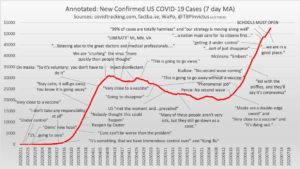Unfortunately I now feel the need to do a weekly linkfest solely dedicated to the coronavirus pandemic. You can read last week’s edition here. Please be careful and stay safe.
Quote of the week
Tess Wilkinson-Ryan, “At the least, government agencies must promulgate clear, explicit norms and rules to facilitate cooperative choices.” (The Atlantic)
Chart of the week

Months of denial, illustrated. (@TBPInvictus)
Masks
America still doesn’t have enough N95 masks. (Vox)
Why is there still a PPE shortage? (New York)
Retail workers are being put in an impossible situation when it comes to masks. (Washington Post)
Why the inventor of the N95 got called out of retirement. (Washington Post)
Mask wearing has not caught on the in the UK. (FT)
Face masks “are a symbol and reminder of civic responsibility.” (FT)
Starbucks ($SBUX) is going to require customers wear masks. (Axios)
The anti-mask crowd is losing out. (Fast Company)
Work
It’s hard to argue that working out indoors can be done safely. (NPR)
Is your employer required to notify you if you are have exposed to the coronavirus? (WSJ)
How to prepare yourself for a return to the office. (HBR)
Companies are hiring epidemiologists. (Washington Post)
Vaccines
How the BCG vaccine could provide some protection against Covid-19. (Big Think)
“Antibodies aren’t the be-all and end-all for the immune system — and they aren’t likely to be for COVID-19 vaccines.” (Axios)
A firsthand account of what it is like to be a coronavirus vaccine test subject. (Washington Post)
Testing
Delays in getting back coronavirus test results are growing. (KHN)
Testing has ramped in the US but it is still not enough to quell the pandemic. (FiveThirtyEight)
Testing is important to keep the coronavirus out of nursing homes. (The Atlantic)
On the many benefits of pooled testing. (Marginal Revolution)
Treatments
The design of Covid-19 clinical trials is favoring speed over coordination. (STAT)
Some hope that supplementing with Vitamin D could help stave off Covid-19. (FT)
How antibodies can serve as a bridge to a vaccine. (WSJ)
One challenge is going to be sorting among the different monoclonal antibodies companies come up with. (Science)
It’s still impossible to get around the need for blue horseshoe crab blood in the pharmaceutical manufacturing process. (National Geographic)
Aerosols
The WHO now acknowledges that the coronavirus can be transmitted indoors through the air. (NYTimes)
Not all experts agree that aerosols are likely to spread the coronavirus. (Ars Technica)
Geography
California held the coronavirus at bay for awhile, until it didn’t. (The Atlantic)
The Texas panhandle is now undergoing a second wave of infections. (New Yorker)
Some neighborhoods in New York City may have herd immunity. (NYTimes)
The coronavirus is spreading through fruit warehouses in Washington state. (WSJ)
Canada crushed the coronavirus. The US did not. (GMM)
Symptoms
More Covid-19 survivors are complaining of lingering brain symptoms. (Guardian)
Public health
Why the novel coronavirus is so difficult to stamp out. (Nautilus)
Some are calling for hot spots to shut things down again. (Washington Post)
There’s no place for partisanship in public health. (STAT)
Youth
Alcohol and social distancing don’t work. (Marginal Revolution)
This fresh wave of coronavirus infections skews much younger. (Axios)
Why young people are prone to make mistakes when it comes to socializing. (NPR)
Risks
Our brains are not built for the forward-thinking needed to prepare for novel pandemics. (STAT)
Tim Harford, “We are now at the stage of the pandemic when there is a vast disparity of different attitudes and actions. Some of us are nervous and cautious; some are unafraid and reckless.” (FT)
Assessing risks today is exhausting. (kottke)
Some older Americans are not heeding the warnings about coronavirus. (Washington Post)
Some tips on how to safely expand your coronavirus bubble. (NPR)
Data
The death rate in the US ticked up this week. (Washington Post)
Why aren’t death rates higher in the US? Five explanations. (The Atlantic)
There is strong evidence that Covid-19 drove a rise in deaths not captured by official statistics. (Washington Post)
Why our estimates about the progression of coronavirus, or any other disease, are imprecise. (Scientific American)
Larry Brilliant on what we have learned in the past 100 days about the coronavirus and what has gone wrong. (Wired)
Earlier on Abnormal Returns
Coronavirus links: a talent for forgetting. (Abnormal Returns)
Acceptable risks in a world full of uncertainty. (Abnormal Returns)
Having no plan is just as bad as not following the plan you have. (Abnormal Returns)








